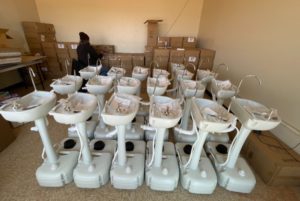In the Navajo Nation, 30 percent of homes lack indoor plumbing.
“In the Navajo Nation, 30 percent of homes lack indoor plumbing. Factors such as these contribute to disproportionate numbers of confirmed cases and deaths related to COVID-19 being reported among tribal communities in Arizona.” said Relief Fund Interim Executive Director Ethel Branch. “Although the Center of Disease Control and Prevention advocates for measures like hand washing to help decrease the spread of COVID-19, many of our tribal members cannot simply turn on a faucet to wash their hands.”
According to an article titled “Radiation illnesses and COVID-19 in the Navajo Nation”, published February 3 by the Bulletin of the Atomic Scientists, residents of the Navajo Nation are 67 times more likely not to have running water or indoor plumbing connected to sewer lines than others in the U.S.
The tribes also face a legacy of legal disputes over water rights with the federal and state governments that further stifles progress in funding and building water projects including more comprehensive water infrastructure.
This lack of water infrastructure has been disastrous for both tribes as they’ve faced the pandemic.
The idea to create the Clean Hands Project began in the fall of 2020 when Relief Fund Board Members identified that over a third of the families requesting Kinship Care Packages (that include food, water, and PPE) also lacked running water.
Board Secretary and Distribution Team Lead for Monument Valley, Utah, Shandiin Herrera began conducting outreach through local elder centers and community members within her region to further assess the need for hand washing stations. Many residents in her region live off the grid which complicated the outreach effort.
“In many cases, it’s very difficult to contact those in need. Many residents of Douglas Mesa and other communities don’t have running water or electricity. On top of this, they don’t have internet or phone services to request our assistance,” Herrera said. “I had to be resourceful in communicating through our community members to assess the need that exists. In this, our teams have been very effective.”
Based on her outreach, Herrera assessed that out of 400 homes in her region, 175 households didn’t have running water. Since December 2020, the Relief Fund has been able to provide 60 hand washing stations to communities in Monument Valley, Utah. Herrera said she has 300 stations available and ready for distribution which she conducts on a weekly basis.
Since the inception of the Clean Hands Project, the Relief Fund has been able to assess that 3,436 households that have requested their assistance on both the Navajo and Hopi Nations live without running water. These numbers are compiled in a database that guides the Project’s distribution of hand washing stations.
Relief Fund Program Manager Mary Francis said her objective with the Clean Hands Project is to distribute stations based on regional needs while prioritizing elders, confirmed COVID-19 cases and special needs individuals.
“We have a system in place where I delegate distribution to our regional team leads and they provide delivery and assembly of the hand washing stations,” Francis said. “Our strategy is to move from region to region and make sure that everyone who doesn’t have running water will at least have a hand washing station to help prevent the spread of COVID-19.”
The hand washing stations consist of a stand that is approximately three-feet in height with a foot pump for hands-free operation of water disbursement, a hand-washing basin, a container that holds fresh water and a liquid soap dispenser.
The Clean Hands Project has distributed hand washing stations in the communities of Jeddito, LeChee, Coppermine, Kaibeto, Kayenta, Black Mesa, Kinlichee, Wide Ruins, Klagetoh and chapters surrounding Gallup, N.M. The Project continues to monitor and assess regional needs for distribution.
“The elders we’ve serviced have been so grateful for something as simple as a sink to wash their hands in as opposed to using buckets filled with water. They’re often amazed at the innovation of the hand washing stations we deliver,” Herrera said.
The Relief Fund continues to implement projects ensuring that the Navajo and Hopi Nations are pandemic-proof and that provide the tools for tribal members to protect themselves from the spread of COVID.
“It is completely unacceptable for such a large segment of our tribal communities to not have basic amenities like indoor plumbing and electricity. The Relief Fund will continue to undertake critical projects like this to combat the disparities that place our communities at heightened risk of spreading COVID-19 and its variants,” Branch said. “Please consider donating to our GoFundMe campaign to help us further these projects that protect our Navajo and Hopi families and elders. Our communities appreciate your generosity.”
Please visit http://navajohopisolidarity.org to learn more about the Navajo & Hopi Families COVID-19 Relief Fund and to place a donation towards their COVID relief efforts.
Please Donate to the Navajo & Hopi Families COVID-19 Relief Fund





